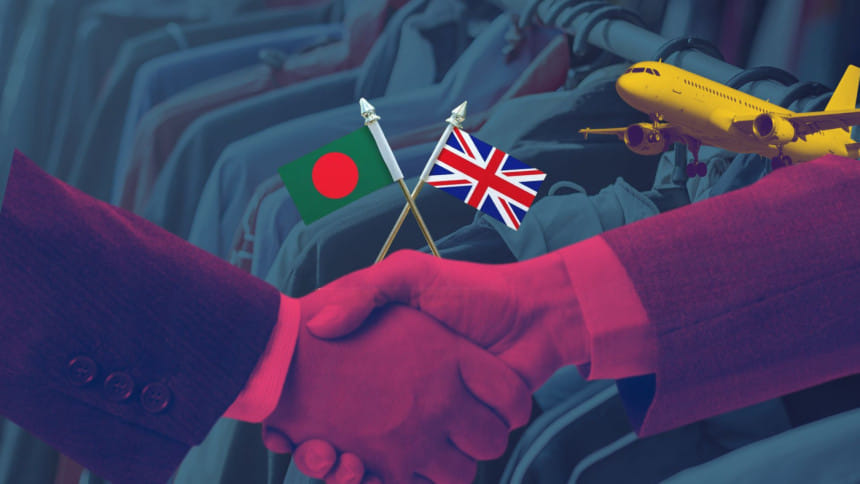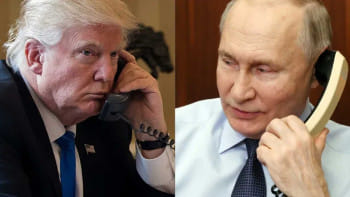Bangladesh needs a free trade agreement with the UK, like India

The recent signing of a free trade agreement (FTA) between the UK and India marks a significant shift in global trade dynamics. This deal, which eliminates tariffs on 99 percent of Indian exports to the UK and reduces duties on 90 percent of goods from the UK entering India, is projected to boost bilateral trade by 25.5 billion pound a year by 2040. This agreement will no doubt positively impact India's textile industry, for which Europe is a major target market.
As a manufacturer deeply invested in our nation's economic future, particularly in the RMG sector, this development is both inspiring and concerning. More than anything, it highlights the urgency for Bangladesh to pursue similar trade agreements to maintain and enhance our competitiveness in key markets like the UK.
Bangladesh's RMG industry is a cornerstone of our economy, contributing significantly to export earnings and employment. In 2024, RMG exports reached an impressive $38.48 billion, with the European Union accounting for over 50 percent of this total. The UK remains one of our top export destinations, with earnings from apparel exports to the UK increasing by 3.74 percent to $2.92 billion in the July-February period of FY25.
However, the global trade landscape is rapidly evolving. Countries are actively seeking bilateral and multilateral agreements to secure favourable trade terms amid heightened protectionist measures by the US. This picture is changing fast. Each day, fresh news emerges of new trade deals being negotiated, and events in the US have certainly had a cascading effect around the world. For this reason, I believe Bangladesh must move quickly.
India's recent FTA with the UK is a testament to this trend, aiming to provide Indian exporters with enhanced market access and reduced trade barriers.
I believe the UK-India FTA sets a precedent that could potentially disadvantage Bangladeshi exporters if similar agreements are not pursued. With India securing tariff-free access for its textiles and other goods, Bangladeshi products might face relatively higher duties, making them less competitive in the UK market.
We all know that fashion and textiles is an industry of fine margins. Price elasticity is high. A small change in prices or costs can have a significant impact on demand. Likewise, small alterations in duties can confer significant advantages.
We must also consider that the UK's trade data indicates a decrease in imports from Bangladesh, amounting to 3.3 billion pound in the four quarters at the end of Q4 of 2024. It is a 2.3 percent decline compared to the previous year. This trend, coupled with India's enhanced access, could further erode Bangladesh's market share in the UK. It is concerning and we need to act now to address this slide and make sure it does not become a long-term issue.
More generally, I am hearing anecdotal evidence of a slowing down of orders for suppliers in Bangladesh amid ongoing challenges in global trade. We urgently need some breathing space right now.
In the face of these developments, Bangladesh must act decisively to negotiate its own trade agreements with key partners, including the UK. Such agreements should aim to secure favourable terms for our exports, particularly in the RMG sector, to ensure continued growth and competitiveness. I know from my many visits to the UK and dealings with UK companies that they greatly value Bangladesh as a competitive, reliable business partner.
Negotiating an FTA is a complex process that requires careful planning, stakeholder engagement, and alignment with national interests. However, the benefits of such agreements, including enhanced market access, reduced tariffs, and strengthened economic ties, are too significant to ignore.
The global trade environment is shifting, and Bangladesh must adapt to maintain its economic momentum. By proactively seeking trade agreements that protect and promote our key industries, we can ensure that Bangladesh remains a competitive player on the international stage. The time to act is now before the window of opportunity narrows further.
Mostafiz Uddin is the managing director of Denim Expert Limited. He is also the founder and CEO of Bangladesh Denim Expo and Bangladesh Apparel Exchange (BAE).
Views expressed in this article are the author's own.
Follow The Daily Star Opinion on Facebook for the latest opinions, commentaries and analyses by experts and professionals. To contribute your article or letter to The Daily Star Opinion, see our guidelines for submission.

 For all latest news, follow The Daily Star's Google News channel.
For all latest news, follow The Daily Star's Google News channel. 










Comments